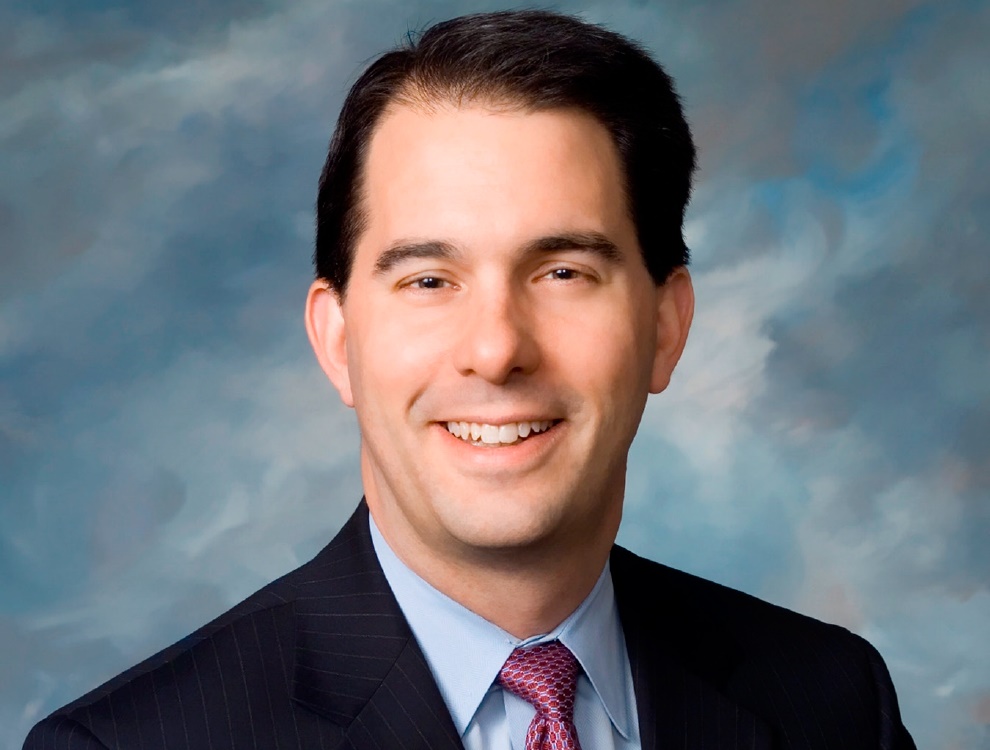How Walker Transformed Wisconsin’s Courts
One-third of all judges in state appointed by Republican governor.
It was about the 65th time that Republican Gov. Scott Walker had appointed a Circuit Court judge, but this one was big news.
“Brad Schimel has shown a commitment to the rule of law and the State of Wisconsin,” Walker said in a Nov. 20 statement. “He will continue to faithfully serve our state as Waukesha County Circuit Court judge.”
Hours after Schimel, a Republican finishing his first four-year term as attorney general, conceded his election loss to Democrat Josh Kaul, the governor who had also lost a re-election bid named Schimel a judge in the county where he grew up and started his career as an assistant district attorney.
Democrats objected. “Even though Wisconsin voters rejected divisive and partisan politicians like Brad Schimel … Republicans have chosen to ignore the will of voters and put politics before people,” Democratic Party Chair Martha Laning said.
*Two of seven justices on the Wisconsin Supreme Court. Justices Daniel Kelly, whose term ends in 2020, was appointed by Walker, as was Justice Rebecca Grassl Bradley, who was then elected to a 10-year term.
*Seven of 16 judges on the four branches of the Court of Appeals. One of Walker’s appointees to the Court of Appeals, former Walker chief counsel Brian Hagedorn, is a candidate in the April election for the Supreme Court seat of retiring Justice Shirley Abrahamson. He is opposed by another Court of Appeals judge, Lisa Neubauer, who was appointed in 2007 by former Democratic Gov. Jim Doyle.
*At least 65 of the 247 authorized Circuit Court judges statewide. Walker has appointed 10 Milwaukee County Circuit Court judges; the county is authorized to have 47 judges.
Overall, Walker’s appointments equal almost one-third of all Wisconsin judges. That does not mean that one-third of all current judges are Walker appointees, however. Some past Walker appointees – former Dane County Circuit Court Judge James Troupis, for example, who worked for Republican officials before his appointment – either did not seek a full term or were defeated when they ran for re-election.
Asked about the process of filling judicial vacancies, Walker said last week: “I have three criteria I look for – a man or woman of integrity, a person who has a solid understanding of the law, and a person who understands that the role of the judiciary is to uphold the Constitution, regardless of one’s personal or political beliefs.”
In Washington, Democrats have accused President Donald Trump of “weaponizing” the federal court system by giving dozens of conservative judges lifetime appointments. The U.S. Senate has confirmed 84 judges appointed by the President, including two Supreme Court justices.
Veterans of Wisconsin’s legal system say they have not seen any political agenda in Walker’s appointments, however.
“I would not say ‘weaponized’,” C. William Foust, a former chief Dane County Circuit judge said. Republican state officials have often called Dane County judges the most liberal in the state.
“I don’t think [Walker] was much different than any other governor in choosing judges who seem to square with [his] belief in what is a good judge,” Foust said. “Gov. Walker’s appointees use language like ‘not an activist’ or ‘apply the law as written’ – empty phrases that have been co-opted by a breed of judge trying to appeal to a certain constituency.”
“Governors and Presidents tend to appoint judges whose judicial philosophy matches that preferred by their party,” Esenberg said. “There is nothing wrong with governors considering judicial philosophy.”
He added, “Gov. Walker no more ‘weaponized’ the judiciary by appointing Rebecca Bradley and Dan Kelly than Gov. Doyle did by appointing Louis Butler,” the first African-American justice who lost his 2008 re-election bid,
And, Esenberg said, “It’s a mistake to think that justices appointed by a Republican or a Democrat will necessarily side with Democrats or Republicans.”
He gave this example: Last term, WILL opposed the Schimel-led Department of Justice in two Supreme Court cases.
“We lost them both, but Justices Grassl Bradley and Kelly dissented,” Esenberg noted. “That had more to do with how they look at the law than partisan calculation.”
Steven Walters is a senior producer for the nonprofit public affairs channel WisconsinEye. Contact him at stevenscotwalters@gmail.com
The State of Politics
-
A Wisconsin Political Trivia Quiz
 Dec 15th, 2025 by Steven Walters
Dec 15th, 2025 by Steven Walters
-
The Fight Over Wisconsin’s House Districts
 Dec 8th, 2025 by Steven Walters
Dec 8th, 2025 by Steven Walters
-
The Battle Over On-Line Betting
 Nov 24th, 2025 by Steven Walters
Nov 24th, 2025 by Steven Walters






















